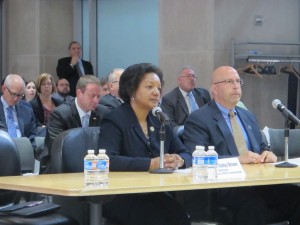Pennsylvania lawmakers seek answers on oil train safety
-
Marie Cusick

Marie Cusick/ StateImpact Pennsylvania
State Public Utilities Commission chair Gladys Brown told lawmakers she’d like to hire more inspectors, however her agency has limited authority over rail safety.
As the shipment of oil by train has skyrocketed in Pennsylvania and around the nation, lawmakers in Harrisburg want to weigh in on safety issues. Unfortunately they have little authority, since the rail industry is regulated almost exclusively by the federal government.
Every week between 60-70 trains carrying crude oil from North Dakota travel through Pennsylvania. The state has had four oil train derailments since the beginning of last year, but none have led to the deadly accidents and explosions seen elsewhere.
At a state senate hearing on oil train safety Tuesday, Public Utilities Commission (PUC) chair Gladys Brown noted that her agency has just 15 inspectors to monitor 5,600 miles of track.
“We would like to increase the number of inspectors,” she told senators. “We know there’s a lot of factors in terms of the types of training they need, but funding is also a big factor.”
But even with more inspectors, the PUC only has authority over at-grade railroad crossings. It also can’t impose fines. That’s handled by the Federal Railroad Administration.
Governor Tom Wolf also recently hired a rail expert to evaluate safety risks, and sent a letter to two major railroads urging them to adopt voluntary safety standards. In his testimony before the committee, Rudy Husband of Norfolk Southern said industry is already working on it.
“We aren’t waiting for experts to come in to tell us how we need to improve safety,” he said. “We’re not waiting for letters from the governor to tell us to improve safety. We are working constantly.”
U.S. Senator Bob Casey (D) is also backing legislation that would levy a fee on oil train tank cars, in an effort to fund emergency training and cleanup costs. In May the federal Department of Transportation announced new rules for oil trains, which will phase out the current tank cars, implement stronger tank car standards, and require upgraded braking systems.
















